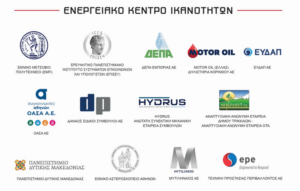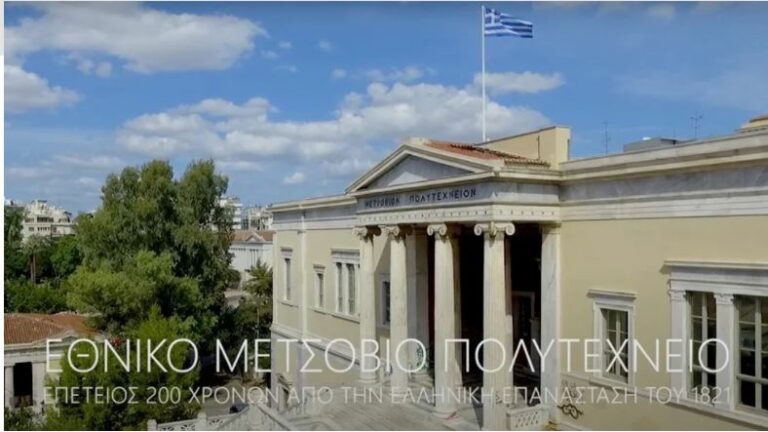The National Technical University of Athens (NTUA) and the Institute of Communication and Computer Systems (ICCS) are pleased to announce the establishment of the first Energy Competence Center in Greece, a cluster that aims to support and promote innovation, entrepreneurship, and technical competencies among enterprises that are operating in the energy sector – a fundamental pillar of the Greek economy.
According to the recent decision of the General Secretariat for Research and Innovation (GSRI) that announces the successful evaluation and approval of the Energy Competence Center, the Competence Center will be formed as a spinoff company targeting the capitalization of relevant research results and know-how produced by universities or other knowledge-producing public organizations in Greece or abroad. In this context, the Energy Competence Center will constitute a public-private partnership scheme, aiming to bridge the gap between demand and supply of specialized innovation services and technology transfer in the energy sector.
The National Technical University of Athens (NTUA)/Special Account for Research Funding has undertaken the coordinating role for the establishment of the Energy Competence Center on behalf of the collaborating bodies. Twelve additional bodies – significant Greek higher education institutions, research institutions as well as companies active in the energy, environment, and economy sectors – are participating to the Energy Competence Center, namely: Institute of Communication and Computer Systems, University of Western Macedonia, DEPA COMMERCIAL SA, Motor Oil Hellas Corinth Refineries SA, MYTILINEOS SA, EYDAP SA, OASA SA, DANAOS Management Consultants SA, HYDRUS ENGINEERING LTD, Trikala Development Agency SA, National Observatory of Athens, Environmental Protection Engineering SA.
According to the medium-term strategy of NTUA and ICCS, the main activities of the Energy Competence Center will relate to:
- Joint use of facilities and equipment, exchange knowledge and expertise, networking, information dissemination, and collaboration between enterprises and other organizations/bodies of the Energy Competence Center.
- Encouraging transfer of technological solutions and innovations to production processes and/or for the production/supply of products/services resulting from the development, adoption, and diffusion of new technologies to companies, to improve their competitiveness.
- Staff training for companies, aiming to the acquisition of relevant skills.
- Implementation of innovative research projects and the development of services/products, actions to promote innovation in domestic entrepreneurship.
In particular, for the business sector and towards their technological and digital transformation, the Energy Competence Center will set priorities focusing on the encouragement of transferring technological solutions and innovations in production processes, the orientation of companies to products and services of high added value, development of comparative advantages, the development of extrovert entrepreneurship and their further networking. Additionally, an important goal is the training of companies’ staff for the acquisition of skills in industry with an emphasis on Industry 4.0.

More specifically, the primary task of the Energy Competence Center is the promotion of innovation in domestic entrepreneurship, the exchange of knowledge and expertise, the development of networks, and the collaboration between companies and other organizations with emphasis on the following subjects:
- Centralised Power Generation in Post-Lignite Era: Hybridization and modification of existing lignite-fired power plants for biomass and natural gas combustion, Integration of anti-pollution and capturing technologies, CO2 storage and utilization, Cogeneration, and tri-generation of heat, electricity, and cold in centralized thermal power plants.
- Renewable Energy Sources (RES) Projects: Economic and social sustainability and sustainability of RES projects, Solar energy, Wind energy, Biomass, Hydroelectric energy, Wave energy.
- Decentralized energy production and saving
- Energy Production and Saving: Waste heat recovery and technologies of cogeneration/ tri-generation of heat, electricity and cold in industry, zero-positive energy buildings and districts.
- Energy Storage: Chemical Energy Storage, Electrical Energy Storage, Electrochemical Energy Storage, Mechanical Energy Storage, Heat Storage.
- Smart Cities and Communities, Sustainable Development, Environment: Electromobility, Sustainable Transportation, Use of Sustainable Resources, Water Resources Conservation, Sewage Treatment, RES-based desalination solutions.
- Transmission and Energy Distribution Networks: Electricity Transmission Networks, Electricity Distribution Networks, Gas and Liquid Fuel Transmission Networks – liquefied and non-liquefied natural gas, hydrogen, SNG, biogas, Combined transmission networks, Storage Stations, Interconnected energy networks for electricity, gas, and liquid fuels, heating and cooling.
“No other sector is as fundamental to the country’s development as well as so closely linked to the well-being of citizens and climate change issues as the energy sector. Universities and Research Centers are currently the main bodies that conduct scientific research and innovation development in the field of energy in the country; however, in addition to promoting science and excellence, our goal in the field of energy should consist of the optimal exploitation of the available energy resources, the constant technology evolution and its practical contribution to the national development and economy” mention in their joint statement the Rector of NTUA Prof. Andreas G. Boudouvis, the Director of ICCS Prof. Yannis Vassiliou and the NTUA Vice-Rector of Research and Lifelong Education and Coordinator of the Energy Competence Center Prof. Ioannis K. Chatjigeorgiou.
The Energy Competence Center aims to strengthen the link between academic research and entrepreneurship and to respond to an essential need for significant projects and investments in large-scale research infrastructure, focusing on energy planning that looks towards the future, creates new development perspectives, and responds effectively to contemporary environmental challenges.
The establishment of the Energy Competence Center was recently approved by the General Secretariat for Research and Innovation (GSRI) in the context of the act “Competence Centers” (CC) with the aim of strengthening integrated plans for the establishment and operation of Competence Centers in the country. The action is co-financed by the European Regional Development Fund (ERDF) of the European Union under the Operational Program “Competitiveness, Entrepreneurship and Innovation” of the NSRF 2014-2020.
from The National Technical University of Athens (NTUA)
Ask me anything
Explore related questions





